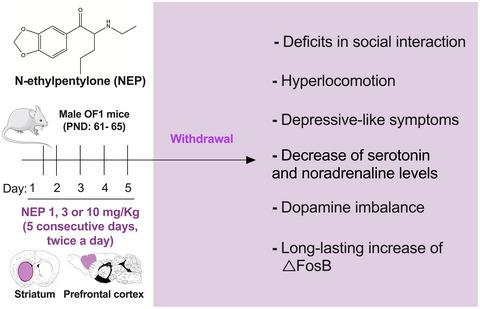当前位置:
X-MOL 学术
›
J. Neurochem.
›
论文详情
Our official English website, www.x-mol.net, welcomes your
feedback! (Note: you will need to create a separate account there.)
Behavioural and neurochemical effects after repeated administration of N-ethylpentylone (ephylone) in mice
Journal of Neurochemistry ( IF 4.2 ) Pub Date : 2021-11-23 , DOI: 10.1111/jnc.15542 María Espinosa-Velasco 1 , Marina D Reguilón 2 , Marina Bellot 3 , Núria Nadal-Gratacós 1, 4 , Xavier Berzosa 4 , Pol Puigseslloses 1, 4 , Cristian Gómez-Canela 3 , Marta Rodríguez-Arias 2 , David Pubill 1 , Jordi Camarasa 1 , Elena Escubedo 1 , Raúl López-Arnau 1
Journal of Neurochemistry ( IF 4.2 ) Pub Date : 2021-11-23 , DOI: 10.1111/jnc.15542 María Espinosa-Velasco 1 , Marina D Reguilón 2 , Marina Bellot 3 , Núria Nadal-Gratacós 1, 4 , Xavier Berzosa 4 , Pol Puigseslloses 1, 4 , Cristian Gómez-Canela 3 , Marta Rodríguez-Arias 2 , David Pubill 1 , Jordi Camarasa 1 , Elena Escubedo 1 , Raúl López-Arnau 1
Affiliation

|
N-ethyl-pentylone (NEP), also known as ‘ephylone’ and N-ethylnorpentylone, has been identified as one of the most recent novel psychostimulants to emerge into the illicit drug market and it has been associated with some intoxications and even fatalities. However, little is known about the consequences of its repeated consumption as well as the role of the monoaminergic system in such consequences. Thus, the aim of our study was to investigate the neurochemical profile and the behavioural effects after both acute and repeated NEP exposure. Male OF1 mice were acutely (1, 3, 10 mg/kg, i.p.) or repeatedly (1, 3, 10 mg/kg, i.p., 5 days, twice/day) exposed to NEP, and anxiety-like behaviour, aggressiveness, social interaction, depressive-like symptoms, body temperature, changes in monoaminergic enzymes and neurotransmitters levels as well as ΔFosB in striatum and prefrontal cortex (PFC) from post-mortem tissue were analysed short after drug-exposure or during drug-withdrawal. Acute administration of NEP induced anxiolytic effects but also an aggressive behaviour and social exploration deficits in mice, which persist during NEP-withdrawal. Moreover, NEP induced hyperthermia as well as depressive-like symptoms after repeated administrations that may be related to the decrease in serotonin and noradrenaline levels observed in striatum and PFC. Finally, the long-term increase in ΔFosB levels in striatum after NEP chronic exposure points to a high risk of dependence. Altogether indicates that NEP consumption induces different neurological and neuropsychiatric disorders accompanied by changes in the monoaminergic system, posing a threat to public health.
中文翻译:

在小鼠中重复施用 N-乙基戊酮 (ephylone) 后的行为和神经化学效应
N-乙基戊烯酮 (NEP),也称为“ephylone”和 N-乙基降戊烯酮,已被确定为最近进入非法药物市场的新型精神兴奋剂之一,它与一些中毒甚至死亡有关。然而,人们对其反复食用的后果以及单胺能系统在这些后果中的作用知之甚少。因此,我们研究的目的是研究急性和重复 NEP 暴露后的神经化学特征和行为影响。雄性 OF1 小鼠急性 (1, 3, 10 mg/kg, ip) 或反复 (1, 3, 10 mg/kg, ip, 5 天, 两次/天) 暴露于 NEP 和焦虑样行为、攻击性、社交互动、抑郁样症状、体温、在药物暴露后或停药期间,分析了死后组织中单胺能酶和神经递质水平以及纹状体和前额叶皮层 (PFC) 中的 ΔFosB 的变化。NEP 的急性给药会引起抗焦虑作用,但也会导致小鼠的攻击行为和社会探索缺陷,这些缺陷在 NEP 戒断期间持续存在。此外,NEP 在重复给药后引起体温过高以及抑郁样症状,这可能与纹状体和 PFC 中观察到的血清素和去甲肾上腺素水平降低有关。最后,NEP 慢性暴露后纹状体中 ΔFosB 水平的长期增加表明依赖的高风险。
更新日期:2021-12-08
中文翻译:

在小鼠中重复施用 N-乙基戊酮 (ephylone) 后的行为和神经化学效应
N-乙基戊烯酮 (NEP),也称为“ephylone”和 N-乙基降戊烯酮,已被确定为最近进入非法药物市场的新型精神兴奋剂之一,它与一些中毒甚至死亡有关。然而,人们对其反复食用的后果以及单胺能系统在这些后果中的作用知之甚少。因此,我们研究的目的是研究急性和重复 NEP 暴露后的神经化学特征和行为影响。雄性 OF1 小鼠急性 (1, 3, 10 mg/kg, ip) 或反复 (1, 3, 10 mg/kg, ip, 5 天, 两次/天) 暴露于 NEP 和焦虑样行为、攻击性、社交互动、抑郁样症状、体温、在药物暴露后或停药期间,分析了死后组织中单胺能酶和神经递质水平以及纹状体和前额叶皮层 (PFC) 中的 ΔFosB 的变化。NEP 的急性给药会引起抗焦虑作用,但也会导致小鼠的攻击行为和社会探索缺陷,这些缺陷在 NEP 戒断期间持续存在。此外,NEP 在重复给药后引起体温过高以及抑郁样症状,这可能与纹状体和 PFC 中观察到的血清素和去甲肾上腺素水平降低有关。最后,NEP 慢性暴露后纹状体中 ΔFosB 水平的长期增加表明依赖的高风险。





























 京公网安备 11010802027423号
京公网安备 11010802027423号